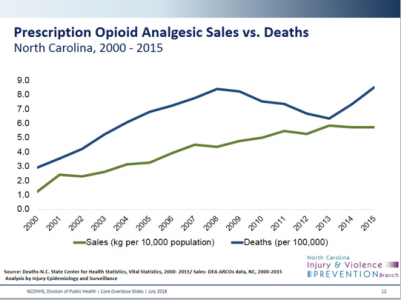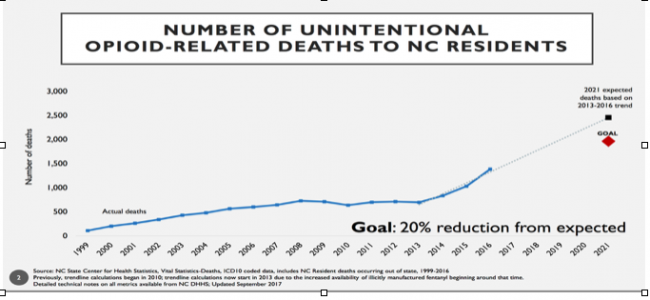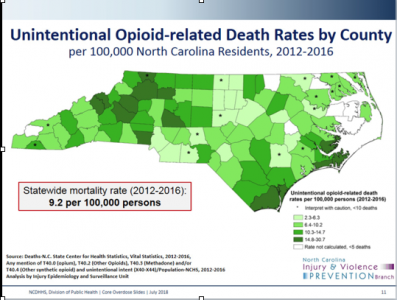Opioid Crisis in NC
Opioid Crisis in North Carolina
Hello again.
In August of 2017, the White House declared a national emergency based on the recommendation from the President’s Commission on Combatting Drug Addiction and Opioid Crisis. Opioid overdose was now the number one cause of unintentional death in the U.S., leading to a decline in lifespan expectancies.
Opioid related deaths are preventable. Then why don’t we prevent it??? What is holding us back???
As much as I would like to answer this question, I do not have one. I do, however, have an opinion: because there is a demand for opioids, there is a supply of opioids. Think of it more like an economic equation: DEMAND=SUPPLY. As the demand increased over the years, supply increased as well, and so has opioid-related deaths. Since the late 1990s, highly addictive pain medications have been improperly thrown into the market by pharmaceutical companies as the most effective way to treat pain. And, every single year, pharmaceutical companies are injecting more and more opioids into the market. Hydrocodones/Oxycodones/Hydromorphones with anti-inflammatories, or with Tylenol or without Tylenol, short-acting, long- acting; the patches, the drops, the capsules, the liquids, and the list goes on and on and on…

I believe pharmaceutical companies have stopped even looking at other classes of new pain medications that are not opioids. One important point which is usually forgotten, is that we do not have any long-term studies on opioid medications. Most studies are conducted for a 6-8 week time span. We all know that opioids do work well for treating acute pain in the short term. What we do not know is their effect on chronic pain— and their effect on the body in the long term when taken daily in the long term. We have no data.
Our clinical experience shows that these medications are not helpful for chronic pain. When taken on a daily basis, opioids cause tolerance and dependency. Tolerance and dependency are not the same as addiction. Tolerance is defined as requiring higher and higher doses of medication in order to get the same effect. This means the dose you took previously will no longer be effective. Some people develop tolerance sooner as opposed to others. Dependency also develops when opioids are taken daily for the long term—both psychological as well as physical dependency occurs with these medications. If you stop the medication abruptly, you will go into withdrawal, which can be very unpleasant. My experience of practicing pain management for over 15 years has shown me that people who take opioids on a daily basis decline in physical and cognitive function over time. Opioids not only cause detrimental side effects on the GI tract, but also on cognitive function, behavior, reaction, and hormones. Patients are asking for these powerful drugs, and they do not want to hear about all the risks related to opioids.
It is estimated, to date that there are more then 600,000 opioid-related deaths in the U.S.. And by 2020, another 180,000 more opioid-related deaths are predicted. In 2016 alone, there were approximately 42,000 deaths related to opioid overdose.
States have initiated their own efforts to fight the opioid epidemic. North Carolina was hit hard by the opioid epidemic. NC has made significant progress in the last two years fighting this epidemic, but still has more work to do. NC Opioid Action Plan was created in 2017, with the intent to identify high-impact strategies in order to reduce opioid-related deaths. The focus of this action plan is to create a coordinated infrastructure, reduce oversupply of prescription opioids, increase community awareness and prevention, make naloxone widely available, expand treatment- and recovery-oriented care, and to measure the impact and revise the strategies as needed.

The opioid crisis seems to have a higher impact in most rural areas and among lower socioeconomic classes. As the awareness of opioid misuse among healthcare providers widens, and providers are no longer willing to prescribe opioids, the trend has shifted towards more cocaine or heroin use, which is more available and cheaper than prescription opioids. However, let’s not forget that most people choosing these street drugs usually start with prescription drugs. I would like to see the NC Opioid Action Plan focuses on educating people in rural areas, putting them into the workforce, and making mental health treatment more widely available.

At Triangle Pain Consultants, our goal is to offer a multidisciplinary approach for patients with chronic pain, and increase the awareness in our community about the opioid crisis. Our intent is to identify high-risk patients for opioid misuse and help primary care physicians with their opioid patients before they become opioid dependent or addicted. It is more difficult to treat these patients with other alternative treatments once they become opioid dependent. We have the ability and the resources to offer patients other treatment options in order to reduce opioid intake. Our strategy is to diagnose pain generator accurately and treat pain effectively.
Aysel Atli, MD, MPH
“Before you heal someone, ask him if he is willing to give up the things that made him sick” Hippocrates
